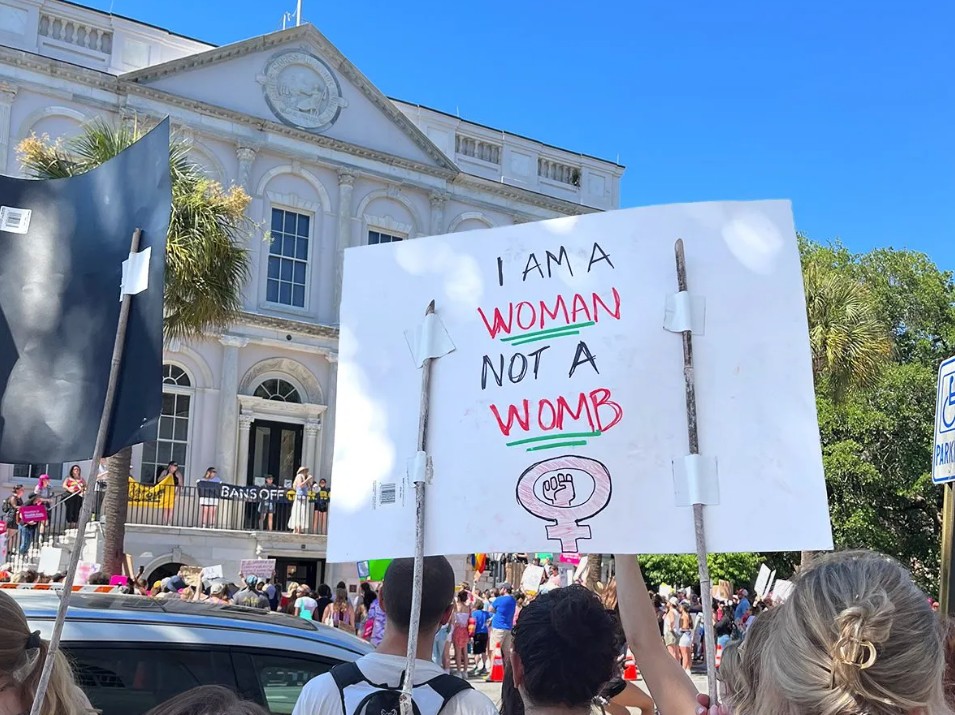
By Lily Levin | South Carolina’s Supreme Court — the only all-male state Supreme Court in the nation — on Wednesday upheld a six-week abortion ban in a 4-1 ruling. It reversed a January decision by the high court to strike down a similar ban passed in 2021.
So what changed? The make-up of the court. In February, Justice Kaye Hearn, the only woman on the high court, retired following the January ruling. A conservative state judge, Gary Hill, replaced her on the court in the spring. He voted this week to reverse the decision.
Earlier this year, the court voted 3-2 that a six-week abortion ban from 2021 was unconstitutional because it violated the right to privacy enshrouded in the state constitution. But in this week’s majority opinion on the measure passed this year by the General Assembly, Justice John Kittredge wrote, “To be sure, the 2023 Act infringes on a woman’s right of privacy and bodily autonomy…..We think it is important to reiterate: we are constrained by the express language in the South Carolina Constitution that prohibits only ‘unreasonable invasions of privacy.””
The court argued, essentially, that the legislature makes policy decisions, while the judicial branch declares them constitutionally reasonable. Thus, even though the law does infringe on a woman’s essential rights, it does not violate any constitutional provision because it is not, by their definition, unreasonable.
S.C. Gov. Henry McMaster, a longtime proponent of an abortion ban, was overjoyed.
“With this victory, we protect the lives of countless unborn children and reaffirm South Carolina’s place as one of the most pro-life states in America,” he said in a statement.
But a leader of Planned Parenthood South Atlantic, one of the plaintiffs that challenged the legislature’s 6-week ban, called the new ruling “exceedingly dangerous and cynical.”
“Today’s decision puts the dangerous politicization of South Carolina’s highest court on full display and will cause irreparable harm to the people of South Carolina,” said Jenny Black, president and CEO of Planned Parenthood South Atlantic.
Impact of the decision
The 2023 law holds that at around six weeks of pregnancy, “cardiac activity” is present, which is defined by the legislature as “the steady and repetitive rhythmic contraction of the fetal heart, within the gestational sac.” But according to the American College of Obstetricians and Gynecologists, this activity does not scientifically constitute a heartbeat.
Furthermore, at six weeks, many women do not know that they are pregnant. A variety of other factors influence menstruation, including exercise and birth control. The majority opinion of today’s court decision said “specifically, the legislature explained it had placed weight on the fact that a woman could learn of her pregnancy within seven to fourteen days of conception and would have several weeks after that to make her decision and have an abortion if she so chose.”
Catherine Humphreville, an attorney for Planned Parenthood, said the language was factually incorrect. “That’s not how and when at-home pregnancies work.”
Molly Rivera, communications director of Planned Parenthood South Atlantic, added that it’s pretty common knowledge — at least among those who can get pregnant or know someone who’s gone through a period.
Another abortion misconception is based on a 2022 report by the S.C. Department of Health and Environmental Control (DHEC), which states 47.9% of women sought an abortion at six weeks or less. DHEC uses the date of postfertilization, while this bill—and all medical providers— considers the date of conception, which is actually two weeks earlier. “
What DHEC says is six weeks should actually be eight weeks,” said Planned Parenthood’s Vicki Ringer.
“Chaos and confusion”
 There are only three clinics in South Carolina that provide abortions—Planned Parenthood in Columbia, Charleston, and Greenville, Rivera said. Following today’s ruling, two had to turn the vast majority of patients away, according to PPSA’s chief medical officer, Katherine Farris. Only the clinic in Charleston did not have any patients on the schedule today who were seeking abortions. Farris added her colleagues in hospitals across the state also had to turn patients away.
There are only three clinics in South Carolina that provide abortions—Planned Parenthood in Columbia, Charleston, and Greenville, Rivera said. Following today’s ruling, two had to turn the vast majority of patients away, according to PPSA’s chief medical officer, Katherine Farris. Only the clinic in Charleston did not have any patients on the schedule today who were seeking abortions. Farris added her colleagues in hospitals across the state also had to turn patients away.
Right now, clinics are waiting for clarity from the court. The ban, Humphreville said, “is already causing chaos and confusion.”
The new ban makes limited exceptions for survivors of rape and incest. They Can seek an abortion only under the following criteria: that they be under 12 weeks pregnant and they consent to reporting their assault to law enforcement.
Both criteria are extremely limiting, observers say. A 12-week ban on abortion still leads to dangerous health outcomes, according to a comprehensive 2023 report conducted by researchers at the University of San Francisco.
The latter regulation—collaboration with law enforcement — means that survivors have to “undergo the trauma of having this assault shared to another party,” Farris said.
What now?
South Carolina has been meticulously chipping away at abortion protections for years. Telehealth is banned for abortion consultations in both Carolinas, which means that a doctor can’t meet with a patient online to prescribe an abortion pill that they can pick up at their pharmacy, Rivera said.
The only useful thing to come out of this ruling, Rivera continued, is that people now cannot be criminally prosecuted for self-aborting, an action that they take on their own bodies. South Carolina was previously one of the only two states in the country that criminalized self-conducted abortions.
In a dissenting Wednesday opinion, Chief Justice Donald Beatty wrote: “The result will essentially force an untold number of affected women to give birth without their consent.”
And when someone is forced through pregnancy, the consequences can be incalculable. South Carolina’s 2023 Infant Mortality Report, released annually by DHEC’s Bureau of Maternal and Child Health, shows a drastic increase in South Carolina’s infant mortality rate since 2017, especially among non-Hispanic Black mothers. As it turns out, protecting the “unborn” doesn’t actually protect the unborn after they’re out of their mother’s womb: South Carolina’s abortion ban will only increase the infant mortality rate, Ringer said.
What to do if you’re seeking an abortion
Today’s ruling is clouded in confusion—for the providers, the patients and even the justices, who left the meaning of ‘fetal heartbeat’ in their decision “for another day.”
However, here’s what providers do know: if you’re seeking an abortion after the 6-week marker, you can choose to travel to another state with greater protections of bodily autonomy. Maryland and Illinois, for example, are the least restrictive of the states closest to South Carolina.
- Previous coverage: How abortion works in South Carolina
Abortion advocates immediately planned a Statehouse protest at 5 p.m. Aug. 23.
According to Ringer, the future is all about who is representing the people of this state. “Until we change the players, the plays in South Carolina are going to remain the same. We aren’t going to have legislators who wake up and suddenly decide they’re going to listen. We’ve got a lot of fight left in us,” Ringer added.
Lily Levin is a reporter with the Charleston City Paper, where an earlier version of this story first appeared. Have a comment? Send to: feedback@charlestoncitypaper.com
















 We Can Do Better, South Carolina!
We Can Do Better, South Carolina!
Was this measure even considered in the context of the state budget? If abortions had been banned in 2021, 6,300 South Carolina women would have been forced to give birth to unwanted, unloved, or unaffordable children. At that rate by 2033, we are looking at 63,000 children in this state under age ten without parents who want them. Who will pay for these deliveries every year to say nothing of the cost of food, clothing, childcare, health care, housing, lawyers, schooling, job training, prisons, and foster care? What happens to these children if their mothers do not meet the mandatory work requirement for social services?